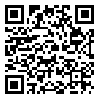Volume 18, Issue 117 (2021)
FSCT 2021, 18(117): 333-341 |
Back to browse issues page
Faculty memmber of food science & technology department,Nour branch,Islamic azad university,Nour,Iran , drsjafarian@yahoo.com
Abstract: (1474 Views)
Abstract
Purpose: Ice cream is one of the most popular dairy desserts in the world. In recent years, the reduction of fat and fiber intake in dietary products has received much attention. Citrus peel is a valuable source of dietary fiber that is usually discarded as waste. In this research, the fiber extracted from Citrus uranium L. peel was used as a novel fat replacer in light vanilla ice cream.
Materials and Methods: 3 levels of Citrus uranium L. Fiber (0.5%, 1%, and 1.5%) were added to low fat vanilla ice cream formulation. The physical, chemical and sensory characteristics of low fat vanilla ice cream were investigated.
Results: The results of this study showed that addition of fiber had a significant effect on the physical properties of ice cream including viscosity and overrun. As the fiber levels increased, the viscosity, melting resistance and overrun of the treatments increased. The effect of fiber on the ice cream pH was significant (P <0.05), with increasing fiber levels, the pH of treatments decreased.
Data showed that the effect of citrus uranium L. fiber on all factors of ice cream sensory evaluation was significantly different (P <0.05).
Based on the results obtained by increasing the percentage of fiber, the highest score in sensory tests was obtained in treatment 2 (containing 1% fiber). The lowest was for treatment 3 (containing 1.5% fiber).
Overall, the results showed that fiber can be used to produce low-fat ice cream with appropriate physico-chemical and sensory properties.
Keywords: low fat ice cream, fiber, physico-chemical properties, sensory evaluation.
Purpose: Ice cream is one of the most popular dairy desserts in the world. In recent years, the reduction of fat and fiber intake in dietary products has received much attention. Citrus peel is a valuable source of dietary fiber that is usually discarded as waste. In this research, the fiber extracted from Citrus uranium L. peel was used as a novel fat replacer in light vanilla ice cream.
Materials and Methods: 3 levels of Citrus uranium L. Fiber (0.5%, 1%, and 1.5%) were added to low fat vanilla ice cream formulation. The physical, chemical and sensory characteristics of low fat vanilla ice cream were investigated.
Results: The results of this study showed that addition of fiber had a significant effect on the physical properties of ice cream including viscosity and overrun. As the fiber levels increased, the viscosity, melting resistance and overrun of the treatments increased. The effect of fiber on the ice cream pH was significant (P <0.05), with increasing fiber levels, the pH of treatments decreased.
Data showed that the effect of citrus uranium L. fiber on all factors of ice cream sensory evaluation was significantly different (P <0.05).
Based on the results obtained by increasing the percentage of fiber, the highest score in sensory tests was obtained in treatment 2 (containing 1% fiber). The lowest was for treatment 3 (containing 1.5% fiber).
Overall, the results showed that fiber can be used to produce low-fat ice cream with appropriate physico-chemical and sensory properties.
Keywords: low fat ice cream, fiber, physico-chemical properties, sensory evaluation.
Article Type: Original Research |
Subject:
Food formulations
Received: 2020/03/3 | Accepted: 2021/07/3 | Published: 2021/11/1
Received: 2020/03/3 | Accepted: 2021/07/3 | Published: 2021/11/1
| Rights and permissions | |
 |
This work is licensed under a Creative Commons Attribution-NonCommercial 4.0 International License. |


